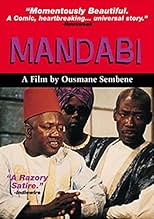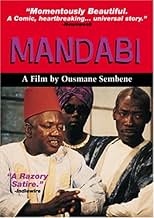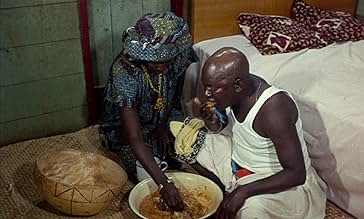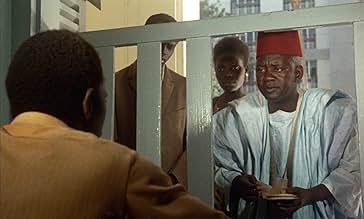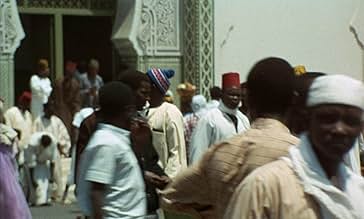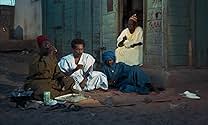Füge eine Handlung in deiner Sprache hinzuA money order from a relative in Paris throws the life of a Senegalese family man out of order. He deals with corruption, greed, problematic family members, the locals and the changing from ... Alles lesenA money order from a relative in Paris throws the life of a Senegalese family man out of order. He deals with corruption, greed, problematic family members, the locals and the changing from his traditional way of living to a more modern one.A money order from a relative in Paris throws the life of a Senegalese family man out of order. He deals with corruption, greed, problematic family members, the locals and the changing from his traditional way of living to a more modern one.
- Regie
- Drehbuch
- Hauptbesetzung
- Auszeichnungen
- 1 Nominierung insgesamt
- Méty the First Wife
- (as Yunus Ndiay)
- M'barka the Shopkeeper
- (as Mustapha Ture)
- Imam
- (as Serine Ndiay)
- Abdu the Nephew
- (as Moussa Diuf)
- Madiagne Diagne the 2nd Neighbor
- (Nicht genannt)
- Bah the Postman
- (Nicht genannt)
- Public Writer at the Post Office
- (Nicht genannt)
- Gorgui Maïssa the 1st Neighbor
- (Nicht genannt)
Empfohlene Bewertungen
It's pretty striking how this man absolutely rules the roost over his wives at home, but is almost helpless in a world that is modernizing around him. He's been unemployed for four years, can't read (at least the French he needs to), and is often at the mercy of people far more savvy than him. In trying to get the proper forms filled out to get an identity card, which can then be used to cash the money order, he's asked for his date of birth, and he doesn't even know that, just that he was born "sometime around 1900." He can barely keep his oversized outfit from poofing out while walking around, a contrast to how elegant his wives are while they stroll around. He's a petty tyrant at home, threatening his wives with a backhand and having them wait on him, hardly a sympathetic figure, but almost a child in the world, and it's hard not to empathize with his growing humiliation.
Eight years into its independence, there is a criticism of Senegal here - how French was still the official language despite most of its citizens only speaking Wolof or Arabic, how women were being treated, how good people lived in poverty, and how layers of corruption existed in the system, including the new bourgeoisie. There is quite a contrast to the modern home of the man's nephew, and it's soul crushing how he takes advantage of his own uncle, perhaps the ultimate statement from Sembene of capitalism devouring people.
On top of its sociopolitical messages, this is a beautiful film. The colors in the fabrics and décor are rich and gorgeous, and the traditional music composed by Sembène is a treat to listen to. The film moves along with good pace, and the storytelling isn't forced or preachy. Quite a nice little find.
Wusstest du schon
- WissenswertesFirst film made in an African language: Wolof, which is the most widely spoken language in Senegal.
- PatzerIn the scene where Ibrahima's nephew tells him that his money was stolen by a pickpocket, Ibrahima is wearing a hat with a green, white and yellow pattern and a white pointed end. When he and his nephew walk to the car, he suddenly wears a fez, and when they arrive at Ibrahima's home, he is again wearing the patterned hat.
- Zitate
Ibrahim Dieng: To tell you the truth, decency has become a sin in this country. And that's why I'm going to become a wolf among wolves! I too will become a thief and a liar!
- VerbindungenReferenced in L'envers du décor (1980)
Top-Auswahl
- How long is Mandabi?Powered by Alexa
Details
- Erscheinungsdatum
- Herkunftsländer
- Sprachen
- Auch bekannt als
- Die Überweisung
- Drehorte
- Dakar, Senegal(Centre town, far shot of the mosque, and suburbs.)
- Produktionsfirmen
- Weitere beteiligte Unternehmen bei IMDbPro anzeigen
Zu dieser Seite beitragen


